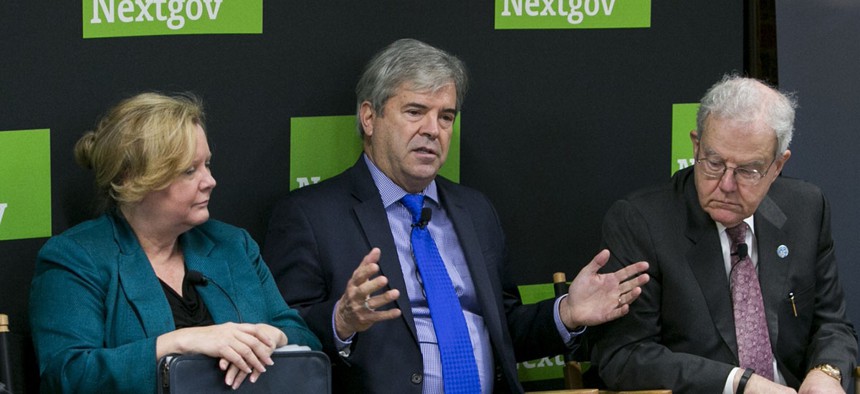What the T in FITARA Really Means

Transportation Department CIO Richard McKinney, center, discusses FITARA. Kristoffer Tripplaar
Teamwork makes a whole lot more sense than infighting and mass confusion.
The Federal Information Technology Acquisition and Reform Act tends to be associated with chief information officers across government. That makes sense, because the legislation is supposed to give CIOs the power of the purse when it comes to tech investments.
Yet, a conversation Monday among the top tech, budget and procurement officials at the Transportation Department highlights the importance teamwork -- not technology -- plays in properly implementing FITARA.
“I think the only way FITARA works is with a team,” said Laura Ziff, DOT’s budget director during a panel at the ACT-IAC Management of Change conference Monday in Cambridge, Maryland. She was joined by the agency’s CIO, Richard McKinney, and Chief Procurement Executive Willie Smith.
Ziff argued that DOT’s successful implementation of FITARA so far is the result of both a solid law and a rock-steady relationship among the agency’s key decision-makers. For examples, during the panel, it was revealed that McKinney’s well-publicized freeze on IT spending – invoking FITARA for the first time – was actually signed off on by Smith and Ziff, along with a cadre of CIOs who report up to McKinney.
» Get the best federal technology news and ideas delivered right to your inbox. Sign up here.
“We started the dialogue early on at DOT, bringing everyone in and getting them to embrace it,” McKinney said. “We were having a robust conversation about acquisition issues, budget issues and human capital issues.”
This collaborative, functional environment mirrors the kind of conversation oversight officials in Congress are pushing agencies to strive for.
Last week, House Oversight and Government Reform IT Operations Subcommittee Chairman Rep. Will Hurd, R-Texas, suggested chief financial officers and CIOs ought to testify together at the next FITARA Scorecard hearing.
Hurd also suggested a new criteria – CIO authorities – be added to the scorecard so agencies are assessed against how much control over IT purchases their CIOs actually have. At the hearing, Dave Powner, director of IT management issues for the Government Accountability Office, told Congress that “some CFOs are worried about losing power,” and that power struggles between CIOs and other budget and procurement officials in agencies are commonplace.
“One of the things I noticed early on is that we all have different culture, different languages, different expectations … “You really are having to come up with a common dialogue,” Ziff said.
That dialogue included a series of frank conversations. McKinney, for example, gave a speech to DOT’s procurement council – chaired by Smith – after some contracting officers were concerned at first about FITARA “usurping contractor’s authorities.”
DOT’s collaborative environment, then, may be the exception, not the rule across government. But to its leading officials, teamwork makes more sense than infighting and mass confusion.
“We realized that IT is going to be a big part of our spend for the foreseeable future,” Smith said.
“And my biggest customer is sitting right here,” Smith added, pointing to McKinney.
NEXT STORY: So, What Does a CIO Actually Do All Day?






